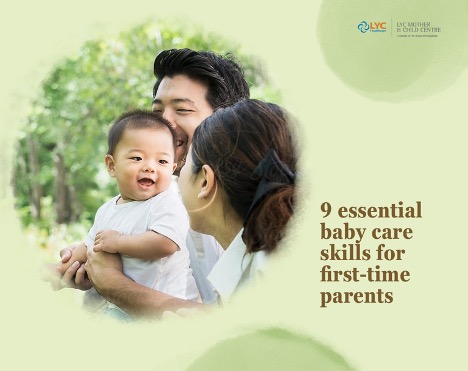
As your baby grows and develops, are you worried if you are doing enough to care for your little one?
As a new parent, it is especially important to master essential baby care skills during the pregnancy period. This not only ensures that you are well prepared to welcome the arrival of your baby with confidence, but also lays a solid foundation for the healthy growth of your baby in the future. Below are 9 important baby care skills:
New parents must learn how to deal with minor injuries, prevent choking hazards, and when to seek medical help. Learn how to respond to emergencies so you can ensure your child’s safety and provide aid in a timely and effective manner.
Understanding your baby’s nutritional needs and providing a balanced diet will help promote your baby’s healthy growth. As your baby grows, you can introduce additional nutrients to supplement breastfeeding or formula milk to meet your baby's growth and development needs.
Establishing healthy sleep habits can not only improve the quality of your baby's rest, but also improve your own wellbeing and happiness. Understanding your baby's sleep cycle and sleep needs can help you develop a sleep plan suitable for your child and improve the quality of life for the whole family.
Understanding the stages of child development allows you to identify potential problems early and support your baby's growth. Paying close attention to your child's development process, promptly detecting developmental abnormalities and taking appropriate intervention measures will help your child grow up healthily and happily.
Communicating with your child in a supportive and constructive way builds a good parent-child relationship. Listening to your child's needs and feelings and communicating effectively can help enhance the understanding and trust between you and your child, as well as help your child develop emotional intelligence and language skills.
Implementing positive discipline strategies can foster good behaviour in children while teaching valuable life skills. Establish clear rules and boundaries, use positive rewards and encouragement, and guide your child to form positive and healthy behaviour patterns.
Protect your baby from accidental injuries by creating a safe environment at home and always being alert to potential risks. Pay attention to protective measures and child-proof your home to ensure your little one grows up in a safe environment and avoid accidents.
Help your child recognise and manage their emotions so they can build resilience and adaptability. At the same time, parents should also pay more attention to their own emotions and try to avoid affecting their child negatively. Establishing a positive and healthy family environment will help your child develop good emotions and mental health.
Prioritise self-care so you have the energy and patience to grow with your baby. Only by paying attention to personal physical and mental health and maintaining good living habits and mentality can we better take care of our children and provide them with a stable and healthy growth environment.